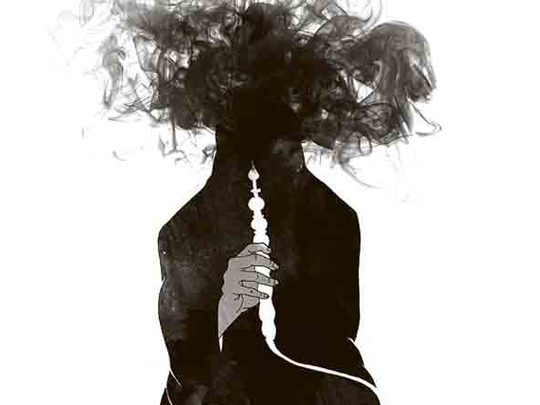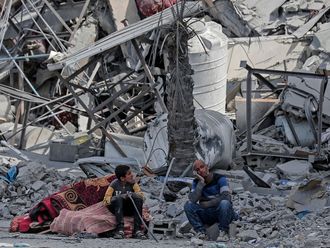
The definition is commonly agreed upon: totalitarian rule is a political system where the state, usually under the control of a single political leader, faction or class, recognises no limits to its authority and strives to regulate every aspect of public and private life, often relying on coercion, terror and violence to enforce its demands — a truly brutish existence that you would not want to wish on your worst enemy.
Hamas, the group that today functions as the government in Gaza, recently passed an ordinance, both petty and infantile, barring women from smoking water pipes in public. Hamas police, as well as plainclothes officers of the security services, reportedly barged into beach cafes along Gaza City's corniche, and issued their verbal orders to the owners, threatening them and their patrons with heavy fines if the ban was not enforced.
Ordinance is too civilised a term to employ here. We understand ordinance to mean a law passed by the elected aldermen of a city council who had for weeks, even months, debated among themselves, and listened to opinions from selected members of the community, before legislating. Not so in Gaza, where the ban on women smoking water pipes was passed at whim and seemingly at the discretion of a handful of men who, with their convoluted concept of Islam, have figured for themselves that the practice is "not Islamic".
Almost laughable
Hamas Interior Ministry spokesman Ehab Ghussain opined to reporters, presumably in all seriousness, that women smoking water pipes in public, especially "with their legs crossed", is "offensive to the image of Islam", and, yes, there have been cases, he said, where "husbands divorced their wives" because of their addiction to the nefarious habit.
You would think that Hamas leaders, fully cognisant of their people's unspeakable suffering in the open-air prison camp they inhabit — where there are few pleasures left for them to enjoy — would let these people siphon off tensions in their daily lives by patronising cafes along the beachfront, a harmless custom that at any rate had been part of Gaza culture for centuries.
But these totalitarian rulers, who you would imagine have, or should have, better things to do on the job than harass ordinary citizens, have not left it at that. They have passed other, equally brusque orders, mostly directed at women. You're a woman in Gaza? Then you can't ride on the back of a motorbike driven by your husband. You need a haircut? Make sure your hair stylist is not a man. You want to take a little walk on the beach, to catch a bit of a cool sea breeze and unwind at the end of another dreary Gaza day? Don't do it unless you're accompanied by a male relative. You're a female lawyer? Well then don't appear in court without a hijab. And so on with the madness.
All this in addition to reported cases of extremists setting fire to several internet cafes and of members of the security services barging in to people's homes, where the residents were "suspected" of drinking alcohol. A warrant to search, issued by a court of law? These folks don't need it, even in the unlikely event that they had heard of such a thing.
Is this really happening in Palestine, a generation of whose people had paid a heavy price, since the late 1960s, to see it emerge as an independent state, a community of laws and institutions, based on a social contract between ruler and ruled, checks and balances? We did not have to be, young as we were then, familiar with the work of Thomas Hobbes, John Locke or Jean Jacques Rousseau to intuit that a social order not governed by the rule of law, but by frivolous and arbitrary commands, noted for their finality of tone and hectoring idiosyncracies, issued by a handful of men with dubious qualifications to govern, would be a cruel terminus to that struggle.
We had looked forward instead to a free society, where in the marketplace of ideas, the best of these — including the best idea of how to spend an evening on the beachfront — are freely embraced. For only in that kind of atmosphere do citizens create possibilities of apprehension and a consensus of perceived values without which progress in culture could not be sustained.
Fear of authority
In the homeland today, a new generation of Palestinians, be it in Gaza or the West Bank, the latter not a haven of liberalism either, is coming of age in a miasma of fear — fear of authority figures and perhaps even fear of life itself.
Were I living in Palestine today (and by a lucky trick of fate I live elsewhere), where these authority figures, who do not feel they are answerable to anyone, rule the land, I too would grow up to fear them and to fear life itself.
When a plainclothes authority figure from the security services, packing a pistol, tells my wife not to cross her legs, or smoke a water pipe in public, I listen to the man with the pistol, maybe even look down the bridge of my nose as I do so. In the presence of a semi-literate, though also decidedly sinister, figure like that, with the power of a totalitarian regime behind him, my buoyant flair for sarcasm deserts me. And I just console myself by writing about it all from a safe distance, without fear of retribution by them.
Gaza's saga is sad indeed, but its people, though clearly not its leaders, continue to elicit the well-deservd sympathy and adulation of the outside world.
Fawaz Turki is a veteran journalist, lecturer and author of several books, including The Disinherited: Journal of a Palestinian Exile. He lives in Washington, DC.










